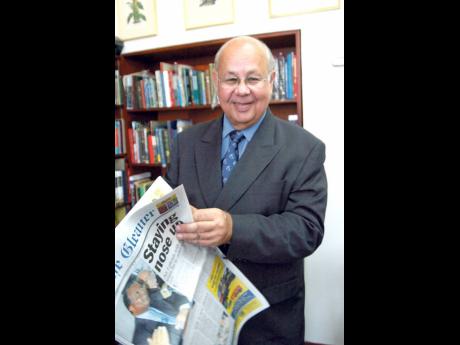AJ Nicholson | Thinking man, indeed
FREEDOM OF the press is, in essence, an offspring of the fundamental right to freedom of expression which is enshrined in the constitutions of practicing democracies across the globe. The late Honourable Oliver Clarke’s life work cannot for a moment be separated from the unending struggle on behalf of press freedom in all such democracies.
That, no doubt, is one of two inescapable reasons why he strongly supported the idea of the absolutely necessary establishment of the Caribbean Court of Justice (CCJ), and openly welcomed its coming into being.
For Oliver Clarke, rightfully, there was a deep measure of incongruity and senselessness in citizens being blessed with the right to freedom of expression without the concomitant privilege of the ability to pursue remedies in all our courts of law, including up to the highest level of appeal, for breach of that right.
Within legal boundaries, the fundamental right to freedom of expression that attaches to all our citizens is also meant to be enjoyed equally by the press. And all persons and entities within our society should be placed in a position to be able to pursue that right without let or hindrance.
STUMBLING BLOCK
Affordability has forever been an unavoidable stumbling block in the way of multiple generations of Jamaicans in the pursuit of remedies in our highest court of law, the distant Judicial Committee of the Privy Council, sited in a country on the other side of the Atlantic.
That did not, and could not, sit well with visionaries like Oliver Clarke who labour daily in the vineyard of press freedom. In his thinking, no entity, including his beloved Gleaner Company, should enjoy any access to our most superior court over and above the access that is open to all who are entitled to pursue violations of any right, in particular, the right to freedom of expression.
And so, for the Honourable Oliver Clarke, the existence of the well-appointed CCJ which is programmed to sit right here within our borders, thereby becoming equally accessible to all would-be petitioners, would serve to remove the age-long obstacle of lack of financial affordability. He was satisfied that this is as it should be in a free and democratic society.
There is a second solid reason why there should be no surprise or wonder in Oliver Clarke’s push for Jamaica to delink from the jurisdiction of the United Kingdom-based Judicial Committee of the Privy Council.
He was to come to occupy a position in the highest echelons of leadership of the venerable institution, the Jamaica Gleaner. Both the Privy Council and The Gleaner were established, one year apart, upon the abolition of the slave trade – the former in 1833 and the latter in 1834.
Twenty years ago, in July 2000, the late C. Roy Reynolds, then a freelance journalist, unearthed a March 1901 Gleaner editorial titled ‘The Judicial Committee of the Privy Council’. It read, in part: “Thinking men are not adverse to a great final court of appeal for the empire, but they believe that the Judicial Committee has served its turn and it is now out of joint with the conditions of the times”.
That 1901 lead editorial continued: “ … it is not to be wondered at, therefore, that colonial suitors and lawyers are beginning to question the expediency of the continuation of the Committee, and this feeling is exaggerated by the cumbersome procedure in connection with the court, the delays that are occasioned, (and) the expense incurred …”.
Small wonder, then, that Oliver Clarke, upon assuming that high leadership position at the Gleaner since the mid-1970s, found no reason to deviate from the far-sighted position long arrived at by “thinking men”, and adopted by an editorial board of his predecessors from as early as at the turn of the 20th century.
Oliver Clarke was, as they say, truthfully to the manor born. Yet, exposure to such stark, unacceptable imbalance in access to justice on the part of our citizens would have weighed heavily on him, both in his life work and as a visionary regional leader.
That led him to embrace the Caribbean Court of Justice as an institution which, for him, stands as an essential instrument in the levelling of that playing field and in the equitable and mature development of our people.
The Honourable Oliver Frederick Clarke, lion exemplar of the media fraternity and beyond: thinking man, indeed!
A.J. Nicholson is officer emeritus of the People’s National Party.

